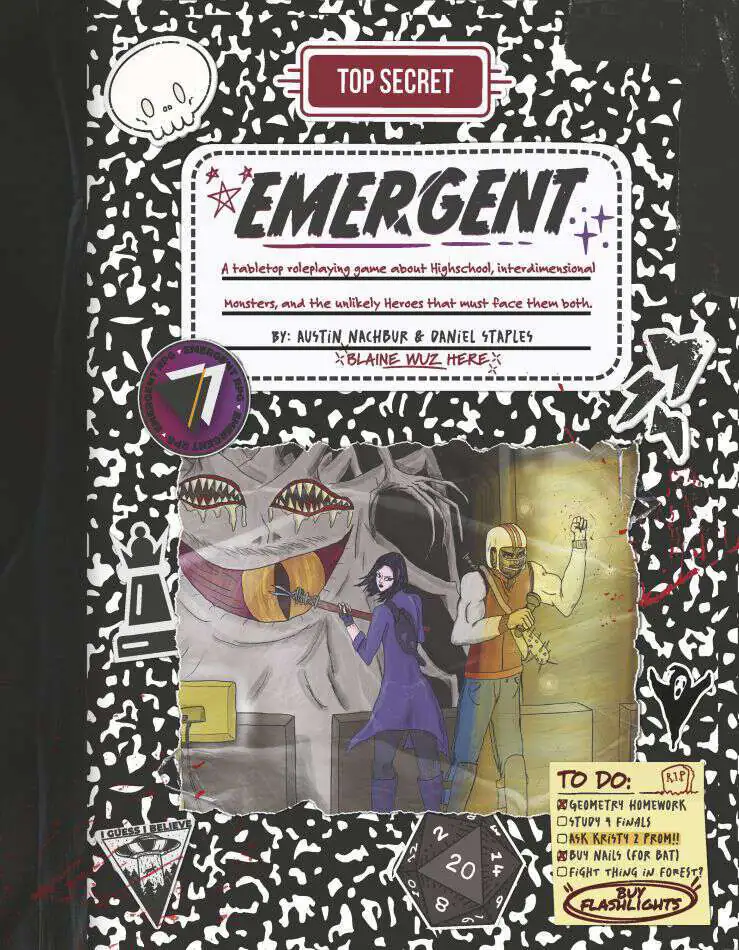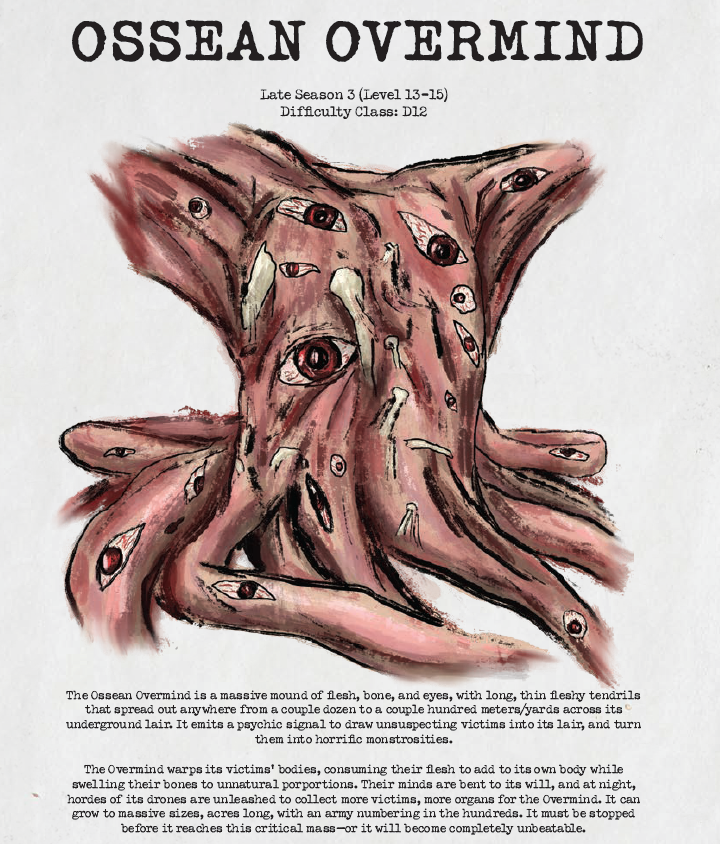What if Stranger Things, Buffy, X-Files, and X-Men Had a Baby? Emergent RPG: A First Look
By JimmiWazEre
Opinionated tabletop gaming chap, who’s very tempted to rewatch Buffy now.
TL;DR:
Emergent is a superhero-horror RPG blending Stranger Things, Buffy, and X-Files vibes. Teens with powers fight monsters while juggling exams and social life. Cool dice mechanics, strong inclusivity, but potentially heavy prep and GM load. Looks promising if you enjoy structured, thematic play.
Disclaimer
Now then! Before we get into the weeds let’s be nice and clear with the disclosure: I don’t want to call this a review because I haven’t played Emergent yet. I’ve definitely not received any financial incentive to write about it, but I did receive a copy of the PDF to share my thoughts on without any actual obligation to do so.
I will be providing affiliate links though, in case Emergent seems like it might scratch your itch, and if you buy from those links I’ll get a small kickback at no additional cost to you.
I trust that we’re all savvy now? Let’s gooooo :)

What Is Emergent?
Just The Facts
| Type | TTRPG |
| Theme | Superhero, horror |
| Players | 2-6 (Including GM) |
| Ages | Teens and up |
| Dev | Shield Brothers Games |
| Pages | 425 |
Successfully kickstarted to the tune of $6,256 in 2024, Emergent has been available digitally since March 2025 and represents the first foray into the TTRPG space for Shield Brothers Games design duo Daniel Staples and Austin Nachbur, with support from graphic designer; Blaine Greenway and a small squad of dedicated Q&A leads and sensitivity readers.
Staples and Nachbur began collaborating in college after they realised that they were both separately developing similar things, and decided to combine their projects into one, Emergent is the product of that collaboration - 425 pages all written in a diegetic style, as if the reader is inheriting a set of responsibilities, passed down from the old guard to the new.
What’s it Trying to Do?
Emergent wears its inspirations quite proudly. Stranger Things, X-Men, Supernatural, IT, Alan Wake… For me personally, I can see Buffy the Vampire Slayer and the X-Files embedded into it’s DNA too. That’s a lot to be blending together so let’s unpack it a bit:
It’s a superhero game, in Emergent your protagonists have been touched by the interdimensional fallout that explodes into our world when the barrier between Earth and the ‘Transverge’ breaks down. This singularity gifts you with minor powers that set you ahead of other humans, but it also draws the attention of ‘Division Omega’, the sinister shadow-government organisation responsible for all the transdimensional meddling in the first place.
It’s a horror game. Unknowable monstrosities call the Transverge home, and when they break through they’re angry, confused, and hungry. If you sit back and let Division Omega handle it then they’ll probably discover you too. That’s bad, you don’t want to be dissected and turned into the bioweapons of tomorrow, so you’ve got no choice but to defeat these Lovecraftian horrors yourself, all quiet-like. The only problem? They’re stronger than you and they’re getting stronger all the time.
It’s an investigation game! In order to get the edge, you’re gonna need to spend some time on recon, maybe investigating local sites of monster activity to look for clues, or heading to the library to check out the section on strange mythical beasts? It’s only when you understand the vulnerabilities of the monster that you should attempt a final confrontation. You’re going to need a plan.
“Pass Your Exams. Slay a Monster. Make it Home for Dinner”
It’s a coming of age game. Protagonists in Emergent are teenagers, typically in high school or college, learning to be adults, learning to accept themselves, learning how to survive in society. You’ve got to contend with the monsters whilst juggling all that stuff too, otherwise you risk becoming stressed out, socially ostracised, or failing your exams! I don’t want you to think this is just fluff though, this stuff is part of the core gameplay loop. Outside of school, work, and extracurricular activities you have limited time in your week, less so when your companions are also available. How are you going to make the most of it?
What Stands Out to Me?
Inclusivity
One thing that stands out straight away reading through Emergent is how seriously it takes inclusivity. The rulebook doesn’t shy away from pointing out ugly issues present in the real world (racism, sexism, homophobia) but it’s clear that whether these appear at your table is a matter of group consent.
Even in the sample cast of ‘Emergents’ (the game’s name for the superhero protagonists), inclusivity is matter-of-fact. Ash, for instance, is trans, but that detail is presented alongside her love of painting minis and running the school newspaper. It’s baked into the fabric of the game.
The result is a book where allyship feels foundational instead of performative.
The Core Mechanic
I love a cool core dice mechanic, and I’ve not seen this one before. To succeed in a check, you need to roll under your attribute + skill stats. The GM modifies the difficulty by setting the dice size (using the standard set of seven as made popular by D&D).
So, an easy task might use a d4 (more chance of rolling low, which is good) and a nigh on impossible task might be a d20. In this way, the game has two clear variables at play: firstly, how good your character is at a given skill - represented by their stats. Secondly, how difficult that particular expression of the skill is.
I’m also a big fan of the rulebook loudly making the point that skills checks should only be called for when failure carries risk. As opposed to calling for checks willy-nilly at every little thing that PCs might attempt to do.
Time & Scheduling
Emergent takes and tracks the passage of time very seriously. Gary Gygax would be proud!
Each day is broken into nine playable chunks called “sequences”. Three of these are for sleep (usually skip these), and three are reserved for school (sometimes skip these, unless there’s an interesting reason not to). That leaves you three sequences for responsibilities (like work and after school clubs), monster hunting and downtime.
At character creation all the players work together to build a shared calendar so that they can see when the group is free. Ideally, the PCs schedules overlap in places to allow for group monster hunting! However, the rules do encourage some deliberate mismatching to encourage the occasional solo scene too.
This strikes me as quite novel for a game to explicitly map out the PCs schedule like this. Most just hand wave it away, and it’d be interesting to see if this formal structuring impacts the natural flow of gameplay.
You might be asking ‘Why wouldn’t the PCs just ignore school and focus solely on the monster hunting?’ Well, for the same reason that Buffy the Vampire Slayer still went to class - exams, grades, and social obligations matter. Skipping them risks failure, expulsion, or drawing the wrong kind of attention.
Emergent goes a step further. If characters start blowing off school or other commitments, they accumulate Stress, which can escalate into Strain. In play, these translate into stat debuffs and penalty giving special rules - tangible consequences for ignoring the pressures of everyday life.
Superpower Themes
One of Emergent’s most eye-catching features is its catalogue of distinct superpowers. Each is presented as a theme, categorised into frontliner (tank), informant (scout), runner (skirmisher), support (healer), or controller (crowd control). Within those, abilities are unlocked as your character advances using a nodal system that connects abilities. You can only unlock a new node if it links to one you’ve already taken.
While these powers are written in a directive style similar to how D&D lays out spells, Emergent also stresses that abilities should be applied creatively at the GM’s discretion. The intent is to push players to think beyond the exact wording on their character sheet and use their powers imaginatively in the fiction.
Where things get particularly juicy is with Power Weaving. At higher levels, characters can choose to “weave” a second power into their existing one, broadening their toolkit in a way that’s reminiscent of multiclassing in D&D. A Blink user, for example, might weave Psyche to combine teleportation with telepathy.
Crafting
Crafting works through a recipe structure. Players gather components, match them to a blueprint, and assemble the item. Blueprints cover melee weapons, spray weapons, explosives, armour, and traps and even include the option for your players to MacGyver up anything that seems reasonable like the ruddy A-Team!
It’s good to see that crafting has consequences. Items can carry defects, and repairing damaged gear may become necessary. Because each Monster has unique weaknesses, the crafting stage is often where strategy takes shape. Players brainstorm together, share resources, and prepare tools that can turn an impossible fight into a survivable one.
Time is the limiting factor. Crafting takes up Sequences on the daily calendar, so every nail bat, molotov, or improvised trap represents time that could have been spent studying, resting, or keeping up with work.
Potential Friction Points
Possibly Heavy GM Mental Load
There’s a risk that the game undermines its otherwise elegant core mechanic. The GM doesn’t just pick the base difficulty die; they also decide when to apply advantage/disadvantage (shifting the die size), and when to apply situational modifiers (±1 to the skill). That’s three layers of judgement on every roll.
In my view it adds unnecessary cognitive load, and over a few hours of play I can imagine GMs starting to feel that weight. I’d houserule those away and replace them with a slight buff to player stats at creation.
Of course, your own mileage may vary depending on how comfortable you are juggling modifiers.
Emergent Gameplay?
Ironically for a game called Emergent, I wouldn’t say it proactively supports Emergent gameplay styles in the low-prep OSR sense, where outcomes arise unpredictably from light-touch systems or improv riffing from random prompts.
Instead, I can imagine game prep being quite involving, similar to a Call of Cthulhu session where the GM has to design the clues in advance so that they actually connect to a solvable answer. Additionally, the monster hunting loop follows a predictable pattern of investigate scenes, gather clues, discover weaknesses, prep, and then fight.
Call of Cthulhu is great, but I’ve only ever run it episodically and occasionally. That keeps the prep from becoming exhausting and stops players from familiarising themselves with the structure too much.
From my read through, Emergent feels similar. That’s not a bad thing necessarily, it just means the game leans into structured, thematic play where everything proceeds more or less to the GMs design, rather being the kind of game which relies on improvising and playing to find out.
Whether that’s your vibe is up to you to decide :)
Do You Want to Know More?
There’s not much information out there about Emergent yet, but Quinn from Shield Brothers Games has GM’d a couple of actual plays. You just go right on ahead and feel free to take a poke if you want to learn a bit more about how the game plays out.
Conclusion
Yeah so, Emergent seems like it should be pretty cool to me, and a couple of my usual players have already decided that it ticks their boxes and are eager to give it a go when time allows. If you want to pick up Emergent it’s available from Drive Thru RPG, and buying from my affiliate link will provide me with a little kickback at no additional expense to you.
Anyway, what do you think to it? Interested? Anything that puts you off? Let me know below the line.
Hey, thanks for reading - you’re good people. If you’ve enjoyed this, it’d be great if you could share it on your socials - it really helps me out and costs you nothing! If you’re super into it and want to make sure you catch more of my content, subscribe to my free monthly Mailer of Many Things newsletter - it really makes a huge difference, and helps me keep this thing running!
Catch you laters, alligators.










I’ve bit the bullet and and I’ve agreed to run a couple of one shots for Pirate Borg. One’s for my regular group, and the other is a group of people I met in a local online community. This is all well and good, but it got me thinking more about Pirate Borg lore.